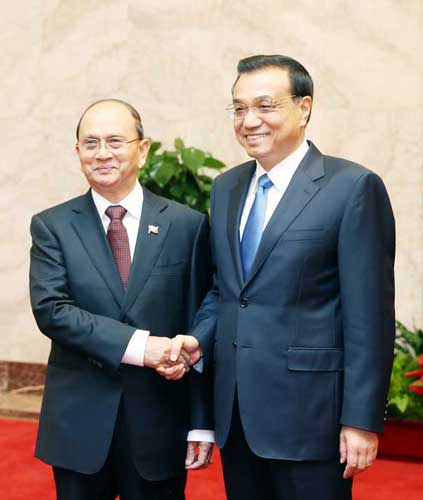 |
|
Premier Li Keqiang shakes hands with Myanmar President U Thein Sein during meetings in Beijing, June 28, 2014. [Photo/Xinhua] |
Premier Li Keqiang said China is firmly committed to regional peace and stability while meeting with leaders of neighboring countries on Saturday.
Li conferred with Indian Vice-President Mohammad Hamid Ansari and Myanmar President U Thein Sein at two bilateral meetings in Beijing, before the three attended the conference marking the 60th anniversary of a historic set of principles to handle international relations: the Five Principles of Peaceful Coexistence.
"Our grand celebration manifested China's determination and confidence to maintain world peace and regional stability," Li said during his meeting with Thein Sein.
Although China has reiterated that its rise on the world stage is peaceful, the country has increasingly found itself being trapped in territorial conflicts. China adjoins 14 countries by land and eight countries by sea.
While meeting with Ansari, who is the first visitor from India's new leadership since Prime Minister Narendra Modi took office last month, Li said China "attaches high importance to the celebration", hoping to send a message to the region and the world that China is firmly committed to maintaining regional stability and world peace.
Li vowed to continue to uphold the Five Principles of Peaceful Coexistence as a major philosophy of China to govern state-to-state relations.
Ansari said the Five Principles of Peaceful Coexistence lay the basis for the belief that a peaceful world can be achieved.
Analysts said the frequent meetings between leaders of the world's two most populous countries showed that the two neighboring giants are determined to put aside their territorial disputes and be more open for cooperation.
Ansari's visit to China will be closely followed by India's top military official Bikram Singh, who is scheduled to come to China from July 2 to 5 to discuss regional security and other issues of common concern with Chinese leaders.
Later this month, Chinese President Xi Jinping is expected to meet Modi at the upcoming BRICS summit in Brazil.
Apart from ongoing talks to settle border issues, China and India are expected to hold a joint anti-terrorism exercise later this year, as part of the activities being arranged to mark the Year of Friendly Exchanges between the neighbors.
Jin Canrong, a professor of international relations from Renmin University of China, said China and India have made great efforts to work out a feasible solution on their border problems and have "seen some noticeable progress this year".
"Modi's government said it will pursue a policy of active engagement with the neighboring countries, which is a clear signal that India has decided to woo relations with China," Jin said.
Before arriving in Beijing, Ansari visited the ancient capital city, Xi'an, in Shaanxi province.
In 1954, the leaders of China, India and Myanmar launched the Five Principles of Peaceful Coexistence. The principles ask for mutual respect for sovereignty and territorial integrity; mutual non-aggression; non-interference in each other's internal affairs; equality and mutual benefit; and peaceful coexistence.
In their respective bilateral meetings, Ansari and Thein Sein said they would work with China to carry forward the Bangladesh-China-India-Myanmar initiative.
zhaoyinan@chinadaily.com.cn
